Kelly Jensen's Blog, page 110
June 30, 2014
High and Dry by Sarah Skilton
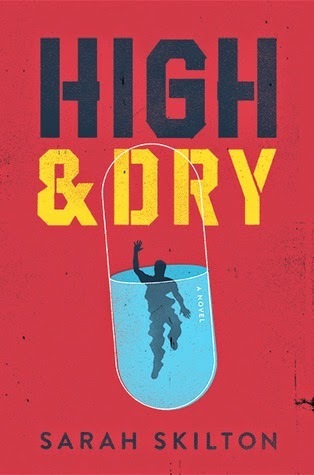 Sarah Skilton's sophomore novel
High and Dry
, a follow-up to her acclaimed debut Bruised, takes her writing in a new direction. It's a noir-ish mystery set in high school; I've discovered that people will give me confused looks when I state this. Apparently the words "noir" and "high school" don't tend to go together in most people's minds. Skilton makes it work, though - for the most part.
Sarah Skilton's sophomore novel
High and Dry
, a follow-up to her acclaimed debut Bruised, takes her writing in a new direction. It's a noir-ish mystery set in high school; I've discovered that people will give me confused looks when I state this. Apparently the words "noir" and "high school" don't tend to go together in most people's minds. Skilton makes it work, though - for the most part.Charlie Dixon is a senior in high school, a star (of sorts) of his school's soccer team, and hopelessly in love with Ellie Chen, who dumped him last week. When the book starts off, we find Charlie feeling very depressed, drinking his sadness away. He's determined to get Ellie back, though she rebuffs him and won't tell him exactly why she decided they shouldn't see each other anymore.
Charlie decides to go to a party where he knows Ellie will be. He gets drunk while there, and after being rejected again, his other ex-girlfriend Bridget gives him a ride home. The next day, Charlie is shocked to learn that a girl from his school is critically ill. She got sick while at the party, and someone driving Charlie's car is the one who dropped her off at the hospital - and then left the scene. It appears Charlie is being framed.
Bridget complicates the situation. She says she left a flash drive in one of the computers at the school library and needs Charlie to help find out who took it, since Charlie sometimes works there. If he doesn't help her, she'll reveal incriminating texts that she set up the night she drove him home while he was passed out. She claims the flash drive has a scholarship essay on it, but Charlie knows there's more to the story.
This book is probably a horror novel for parents who don't realize all the nasty and unsafe stuff their teenagers get up to. It opens with Charlie drinking heavily. There's a big subplot about drug manufacture, use, and sale by teens. There's a cheating scandal and lots of bullying, with some violence. Charlie also gets involved in a soccer match-throwing scheme. There's a lot of dirty stuff going on, which contributes to the noir-ish feel of the story. Charlie's voice, which is the standout of the story, carries the reader through it. He's depressed and hopeful at the same time. He thinks little things are huge deals and reduces important stuff to trivia. He walks a fine line between being likeable and unlikeable, often falling on the wrong side of that line. He's smart about handling the mystery but stupid about handling his relationships with his ex-girlfriends and his friends. His voice is pure teen. It makes him an interesting character, even if as a reader I couldn't root for him to succeed in all his endeavors. This is a fairly short book, but Skilton has created a fully-formed, unique character in Charlie.
As a mystery, the novel is very, very good. It's one of the more complex and interesting mysteries aimed at teens I've read in years. Skilton juggles multiple moving parts successfully, transforming what seems at first to be a simple Encyclopedia Brown-style mystery about a stolen flash drive into an absorbing, multi-faceted mystery that touches on teen alcohol and drug use, mandated standardized testing, fixing soccer matches, friendship, bullying, and even a few problems of teachers and parents. Ultimately, there's not just one thing Charlie needs to figure out - there are several, including what his former best friend is hiding. Skilton skillfully places clues throughout the novel, giving us multiple suspects and a fair few twists and turns. The ultimate payoff is quite satisfying.
As a snapshot of high school life, I think it's less successful. As a way of avoiding the rampant bullying that plagued the high school, all students willingly choose a formal group to be a part of, and their fellow group-mates then protect each other. I don't mean they align themselves with the so-called jocks or nerds; I mean they join an extracurricular sport or club and call themselves a slang term that describes it. The soccer players are the beckhams, for example. There are rules associated with this set-up, too: upperclassmen can't even talk to lowerclassmen without a formal introduction by another upperclassman who knows them both.
I think Skilton is probably making a comment on how we pigeonhole ourselves and others (in high school and beyond), but she didn't sell it well enough for me to buy it. I guess I just found it very difficult to believe that everyone would willingly join something extracurricular. A lot of kids I went to high school with just wanted to go home at the end of the day. It seems like casual gangs would have been more realistic. This is a relatively unimportant thing for most of the story, but a big part of the plot hinges on this aspect of social organization near the end. My inability to suspend my disbelief in this regard lessens the impact of an otherwise very successful story.
Hand this one to your readers who like their mysteries a little hard-boiled. While not nearly as horrifying as Barry Lyga's I Hunt Killers, it's a bit more intense than Todd Strasser's thrillogy (beginning with Wish You Were Dead), despite the fact that there's no real murder here. It's the lifestyle of the teens and Charlie's voice that gives it that edge.
Review copy received from the publisher at TLA. High and Dry is available now.







 Related StoriesThe Kiss of Deception by Mary E. PearsonComplicit by Stephanie KuehnGraphic Novel Roundup
Related StoriesThe Kiss of Deception by Mary E. PearsonComplicit by Stephanie KuehnGraphic Novel Roundup
Published on June 30, 2014 22:00
What I'm Reading Now
With the long weekend and (a few hours in the car) ahead of me, I'm really excited about the extra reading time I'll get to sneak in in the near future. I've been talking about how my reading this year has been slower than normal, but fortunately, it's been getting better in the last couple of weeks. I've been able to get through two or three books a week, which is about my average. I'm finding that working with the slump, rather than trying to not acknowledge and respect it, has been really helpful. Perhaps that's a future post in the making.
That said, here's a peek at what I've got on my short list and what I've got bookmarks in right now.
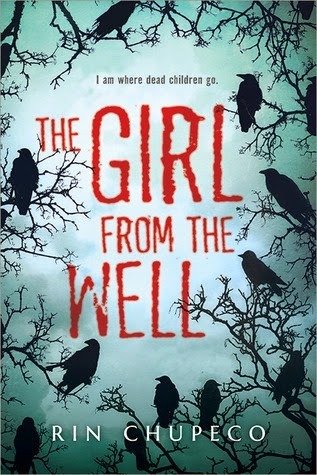
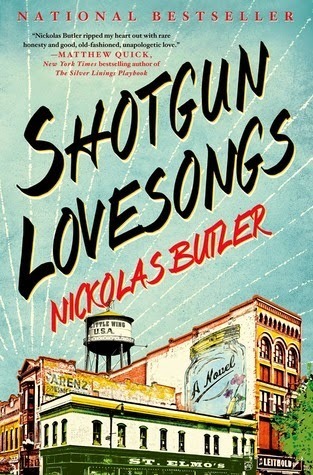
The Girl From The Well by Rin Chupeco (August 5 from Sourcebooks)
This book! It's been in my hands since it came as a bound manuscript last fall, and I'm finally sinking into it. It's been called The Grudge meets Dexter in one description and The Ring meets The Exorcist in another. I think those are all pretty fair comparisons, and I'd say this is the kind of book fans of j-horror will eat up. There is a ghost spirit who is seeking revenge and we all know this isn't going to end well for . . . well probably not for anyone. I'm only a bit into it at the time of this writing, but I am so looking forward to racing through, since the pacing is quick, the writing atmospheric and haunting, and the story absorbing. It hits all my sweet spots for good horror.
Shotgun Lovesongs by Nickolas Butler
Butler's novel has been recommended to me by multiple people, and since I've been on a really positive adult novel reading spree through this slump, I'm eager to pick this one up and dive in. It's about four long-time friends who grew up in the same small Wisconsin town and explores how their lives have changed and shifted and how that plays out in their relationships.
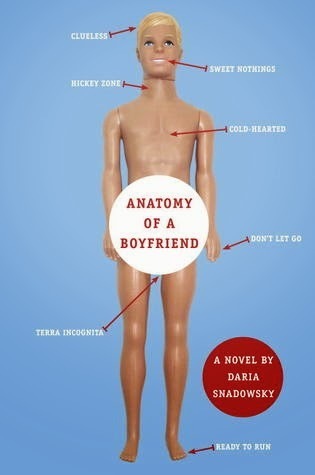
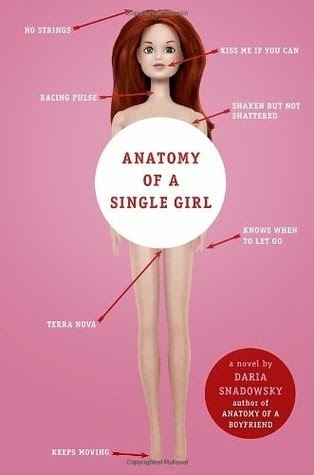
Anatomy of a Boyfriend and Anatomy of a Single Girl by Daria Snadowsky
I haven't read either of these books, but since I've been keeping an eye out for books tackling teen sexuality in some capacity, I know I want to read both of these. Boyfriend is a few years old, but Single Girl came out last year and when it came out, I put them both into my pile of titles to get to, and now they're up. I'm eager for what should be some solid contemporary.
As a side note to this, if you know of any really solid contemporary realistic YA that explores female sexuality that maybe isn't an obvious choice, I'd love to hear about it. I'm especially curious about books out in the last year or two -- the usual suspects are ones I've read. But what may I have missed?
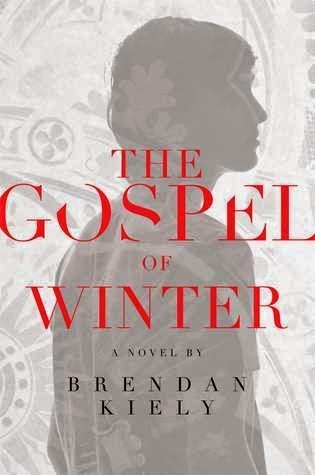
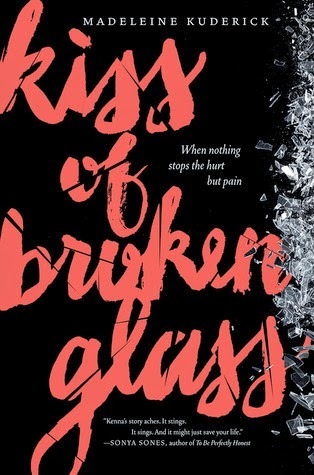
The Gospel of Winter by Brendan Kiely
I didn't know if this was a book I wanted to read for a long time, especially because it does that thing that I find myself turned off by, which is being set in the late 90s/early 00s. But I've read so many great reviews of this and how it explores sexual assault and the way adults can take advantage of teenagers, so I'm going to give it a go.
The cover of Kiely's book is really neat, too. It looks like a standard boy-in-the-shadow cover, but the silhouette is imprinted on the hardcover itself, and the designed white part with the title and author are the jacket -- it might not be vellum proper, but that's what the effect is like.
Kiss of Broken Glass by Madeleine Kuderick (September 9)
A verse novel about a 15-year-old girl who is mentally ill and put under a psychiatric watch for a short period of time. Sold.
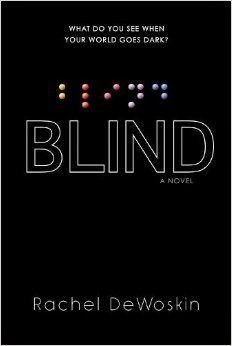
Blind by Rachel DeWoskin (August 7)
It starts on the 4th of July when a wayward firework flies into Emma's eyes, causing her to go blind. This is about what happens as she works through her life in a new way and how she navigates life in her new normal. DeWoskin wrote Big Girl Small, which was an Alex Award winner a few years back and has . . . also been sitting in a pile for me to get to reading since it also sounds like it's up my alley. One thing I'm a little hesitant about with Blind is that it's very long -- over 400 pages. I'm not opposed to big books, but the last few I've read that have gotten that long would have been much stronger were they about 50-100 pages tighter. I'm hoping to be proven wrong this time.
What's on your to-read for the week? What should be on my radar? And if you've read anything here, I'd love to know what you think.







 Related StoriesWhat I'm Reading NowThe To-Read Pile
Related StoriesWhat I'm Reading NowThe To-Read Pile
That said, here's a peek at what I've got on my short list and what I've got bookmarks in right now.


The Girl From The Well by Rin Chupeco (August 5 from Sourcebooks)
This book! It's been in my hands since it came as a bound manuscript last fall, and I'm finally sinking into it. It's been called The Grudge meets Dexter in one description and The Ring meets The Exorcist in another. I think those are all pretty fair comparisons, and I'd say this is the kind of book fans of j-horror will eat up. There is a ghost spirit who is seeking revenge and we all know this isn't going to end well for . . . well probably not for anyone. I'm only a bit into it at the time of this writing, but I am so looking forward to racing through, since the pacing is quick, the writing atmospheric and haunting, and the story absorbing. It hits all my sweet spots for good horror.
Shotgun Lovesongs by Nickolas Butler
Butler's novel has been recommended to me by multiple people, and since I've been on a really positive adult novel reading spree through this slump, I'm eager to pick this one up and dive in. It's about four long-time friends who grew up in the same small Wisconsin town and explores how their lives have changed and shifted and how that plays out in their relationships.


Anatomy of a Boyfriend and Anatomy of a Single Girl by Daria Snadowsky
I haven't read either of these books, but since I've been keeping an eye out for books tackling teen sexuality in some capacity, I know I want to read both of these. Boyfriend is a few years old, but Single Girl came out last year and when it came out, I put them both into my pile of titles to get to, and now they're up. I'm eager for what should be some solid contemporary.
As a side note to this, if you know of any really solid contemporary realistic YA that explores female sexuality that maybe isn't an obvious choice, I'd love to hear about it. I'm especially curious about books out in the last year or two -- the usual suspects are ones I've read. But what may I have missed?


The Gospel of Winter by Brendan Kiely
I didn't know if this was a book I wanted to read for a long time, especially because it does that thing that I find myself turned off by, which is being set in the late 90s/early 00s. But I've read so many great reviews of this and how it explores sexual assault and the way adults can take advantage of teenagers, so I'm going to give it a go.
The cover of Kiely's book is really neat, too. It looks like a standard boy-in-the-shadow cover, but the silhouette is imprinted on the hardcover itself, and the designed white part with the title and author are the jacket -- it might not be vellum proper, but that's what the effect is like.
Kiss of Broken Glass by Madeleine Kuderick (September 9)
A verse novel about a 15-year-old girl who is mentally ill and put under a psychiatric watch for a short period of time. Sold.

Blind by Rachel DeWoskin (August 7)
It starts on the 4th of July when a wayward firework flies into Emma's eyes, causing her to go blind. This is about what happens as she works through her life in a new way and how she navigates life in her new normal. DeWoskin wrote Big Girl Small, which was an Alex Award winner a few years back and has . . . also been sitting in a pile for me to get to reading since it also sounds like it's up my alley. One thing I'm a little hesitant about with Blind is that it's very long -- over 400 pages. I'm not opposed to big books, but the last few I've read that have gotten that long would have been much stronger were they about 50-100 pages tighter. I'm hoping to be proven wrong this time.
What's on your to-read for the week? What should be on my radar? And if you've read anything here, I'd love to know what you think.







 Related StoriesWhat I'm Reading NowThe To-Read Pile
Related StoriesWhat I'm Reading NowThe To-Read Pile
Published on June 30, 2014 05:00
June 26, 2014
Graphic Novel Roundup
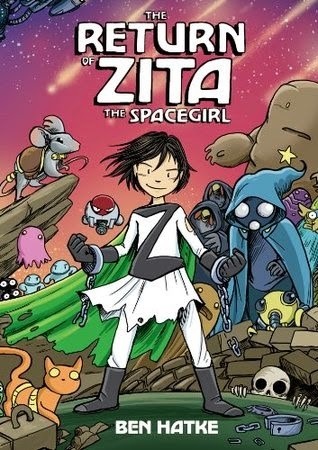
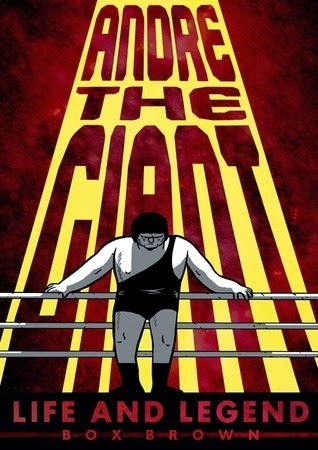
The Return of Zita the Spacegirl by Ben Hatke
We return to outer space for this final installment in Hatke's trilogy about Zita and her adventures on alien planets. Zita has been captured by an evildoer masquerading as an arbiter of justice and put on trial for her "crimes" from the previous two novels. Old friends return to help her escape, of course, and further adventures ensue. Hatke excels at creating truly oddball characters (aliens and robots and strange humans, too), throwing them all together, and letting them develop authentic and fun relationships with each other. The art is lovely as always and the end of the story is poignant and encourages further imagination from the book's young readers.
Finished copy provided by the publisher. The Return of Zita the Spacegirl is available now.
Andre the Giant: Life and Legend by Box Brown
Brown gives a nuanced portrait of the WWF wrestler and actor from The Princess Bride. I knew practically nothing about him going into this other than the fact that he wrestled and acted in the movie; I learned a lot while reading the book. Andre comes across as complex and not always likeable, but that's as it should be. Brown has used multiple sources for this biography, all of which he lists in easy to read format at the end. I rarely read source notes, but these were almost as interesting as the biography itself - they reveal just how much of the book was based on others' perceptions of Andre and how much of it was based on Andre's own words and actions. Most of the book focuses on Andre's wrestling and very little of it on The Princess Bride, so fans of the movie may be disappointed. Adult and older teen readers looking for an absorbing graphic biography should find plenty to like here, though.
Review copy provided by the publisher. Andre the Giant: Life and Legend is available now.
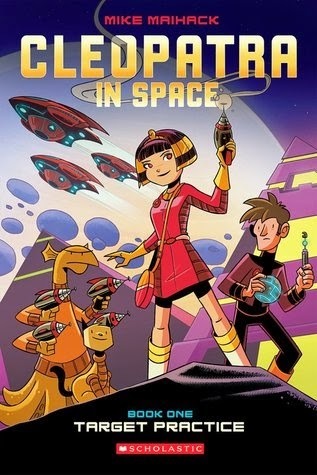
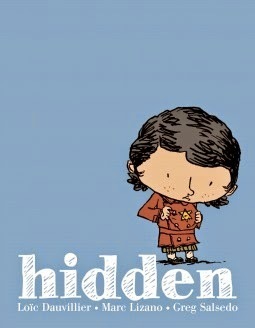
Cleopatra in Space #1: Target Practice by Mike Maihack
This book is exactly what it says: the most famous Cleopatra finds a tablet as a teenager and it sends her into space far, far in the future. She lands at a space school where she learns how to fight as well as more mundane things like algebra. She also learns she's prophesied to defeat a great villain. This is a super fun, full-color graphic novel that smooshes together a lot of high appeal factors: ancient Egypt, space, time travel, a girl protagonist who can fight. It's got a lot of terrific little details: the school is run by cats, a fun nod to the ancient Egyptian reverence of these animals, and Cleopatra's future transportation apparatus is a bike that looks like the sphinx. While Cleopatra is 15 here, the book is best suited (and appropriate) for tween readers. I'll definitely be on the lookout for subsequent volumes.
Review copy picked up at TLA. Cleopatra in Space #1: Target Practice is available now.
Hidden: A Child's Story of the Holocaust by Loic Dauvillier
Dauvillier's graphic novel about the Holocaust - a fictional account, not based on any one particular person - shows that it is possible to successfully address horrifying historical events with young children without traumatizing them. One night, a young child comes across her grandmother and notices she is feeling very sad. The grandmother opens up to her granddaughter and shares the story of her childhood in World War II Paris. As a child, Dounia experienced what it was like to first wear the Jewish star, then be separated from her parents and being hidden by various friends and neighbors as violence against Jewish people in France escalated. It's told in a gentle way, with a focus on universal feelings that both Dounia in the 1940s and her granddaughter in the present day could share. The art is child-friendly and expertly conveys the emotions being expressed. A challenging venture, but well executed.
Finished copy provided by the publisher. Hidden: A Child's Story of the Holocaust is available now.
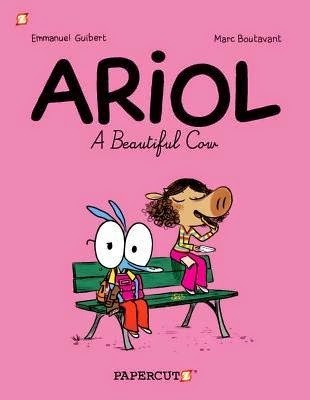
Ariol #4: A Beautiful Cow by Emmanuel Guibert
The Ariol books are collections of slice-of-life vignettes that feature a large group of anthropomorphized animals representing kids about 8-10 years old. Ariol is a donkey who has a crush on a cow named Petula (the cow of the title), but not many of the stories actually involve Petula. Several of them are school stories. One involves a group of the kids/animals thinking they've come down with fleas - but is it just a ploy to get out of class? Another features Ariol and his friend visiting his grandparents; another is about school picture day. The vignettes (drawn with slightly cartoonish, but not exaggerated, illustrations) are relatable to kids with understated, authentic humor. I liked that the kids don't always act very nicely - and that the not-so-nice behavior isn't always followed up with a lecture from the parents on how to act nicer. Guibert shows kids as they are - you know, if they were animals and not people. There's also some dry humor that adults will enjoy. A pleasant, low-key success.
Finished copy provided by the publisher. Ariol #4: A Beautiful Cow is available now.







 Related StoriesThe Kiss of Deception by Mary E. PearsonMambo in Chinatown by Jean KwokComplicit by Stephanie Kuehn
Related StoriesThe Kiss of Deception by Mary E. PearsonMambo in Chinatown by Jean KwokComplicit by Stephanie Kuehn
Published on June 26, 2014 22:00
June 25, 2014
2014 Printz and Morris Predictions at the Half-Way Point
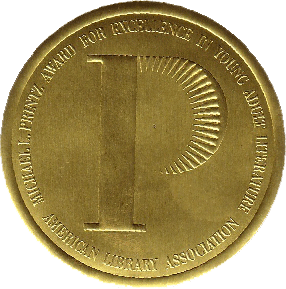
Every year we like to take a stab at what we imagine could be contenders for the Michael L. Printz award half-way through the year and then again a couple of weeks before the award is announced. What's been interesting this year is what a few of the blogs we like to follow for Printz-related predictions and discussions have been eerily . . . silent. People get busy, blogs fade away, but even in the general book world, it seems as though discussion of what could be a Printz contender this year is very, very quiet. So coming up with our guesses and reasons behind them will be interesting because we have very little to base those comments upon so far.
In addition to talking about Printz, we'll talk a bit about the Morris award, too. It's a great award and one that, unlike the Printz, can be a little looser in terms of what books might qualify since it does take reader appeal into consideration. It also takes into consideration the interest in seeing future works from the author, meaning that the books honored can be imperfect but show immense promise and talent.
Of course, we'd love if you weighed in, too. We're sticking to books that have been published between January and July 1, since that's all we've had time to read and discuss. We might throw in some books we think could be contenders in the second half of the year based solely on name and prior merit. So let us know what you think of our thoughts and what you're thinking about at the half-way point in 2014.
Kelly's Thoughts
The Printz
We haven't seen a Printz title yet. Or at least, we haven't seen a big book with Printz written on it yet. Sure, we've seen some books that have been strong and garnered a lot of buzz, but I don't think any of them stands the test just yet. That doesn't mean they're bad or that they're unworthy. It just means nothing has yet screamed this is the one.
That said, here's a look at what I think will generate some solid discussion both within the committee and within the book community who is invested in talking about the Printz. I did spend a little time with Jen J's starred review spreadsheet, which helped me think through some of the possibilities.
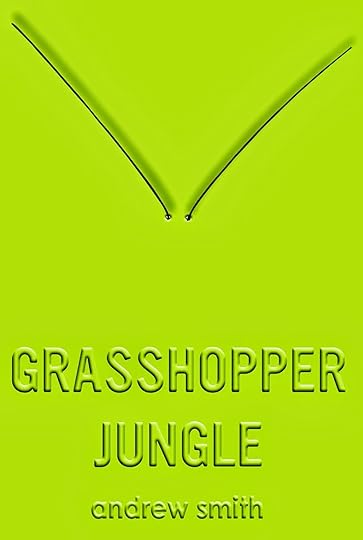
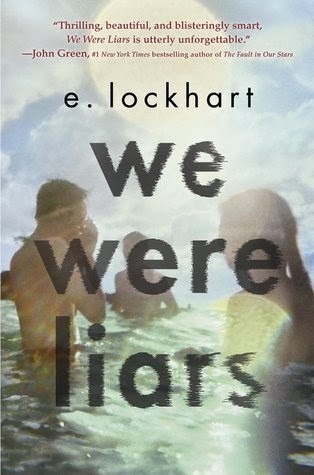
Without doubt, I think the two books generating the most discussion so far this year are Andrew Smith's Grasshopper Jungle and E. Lockhart's We Were Liars. And these discussions aren't without good reason: both are inventive, and both rise above because they're written by seasoned authors who've earned respect and proven they can both tell a good story and do so with strong, sharp writing.
That said, I think both novels aren't strong enough. Smith's novel sort of falls into the camp that Karyn talks about in her discussion of Midwinterblood last year: it's definitely well-written and there's a story here and that story makes sense but it's also a really bizarre story that I wonder if people have found to be exciting because it's weird and different even if they don't necessarily get it. I found there to be some deeply problematic aspects of the story in and of itself, primarily that it's got a lot of issues rendering a single female as a fully-fleshed, worthwhile being in the story (Shann becomes a baby-maker, even when Austin claims he loves her and the adult females in this story are all sad and medical drug-dependent). Is it a neat read? Sure. Is it a Printz? I think it falls apart and I think beyond the issues in story that will pop up, I think some of the construction itself might fail to hold.
E. Lockhart's We Were Liars is a bit stronger than Smith's novel, but I think it's one that will fall apart on subsequent reads. Maybe it's because I read and watch horror, but the plot itself was predictable to me from the onset. I knew what was going on, and because I knew, I spent the read collecting evidence for my hunch. To me, that read as the story's strings being too clear in the writing, and while the style itself is different, it feels overly constructed. The craft was very transparent to me, even when I wasn't looking at it, and I think when the committee sits down to reread, those things will pop out more.
Not relating to the Printz necessarily, but worth mentioning: the marketing on this book continues to drive me nuts because the twist isn't revolutionary. By playing up the idea the twist is that way, I think that the enjoyment of the book is tied up in whether or not the twist was successfully sprung upon the reader.
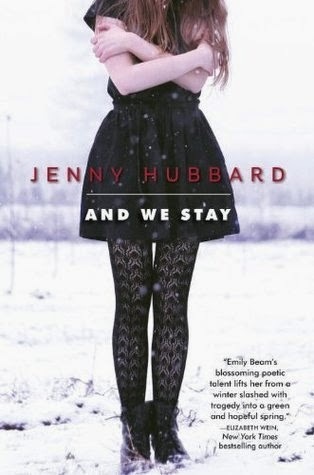
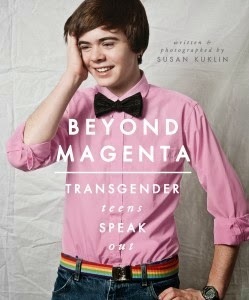
After the Smith and Lockhart books, I had to dig into Jen's spreadsheet to see what books have earned a number of stars. There's Laurie Halse Anderson's The Impossible Knife of Memory, but as I mentioned in my review earlier this year, this book suffers a pacing problem in the final act of the book. It certainly deserved the stars it earned, but from the purely literary standpoint from which the Printz discussion comes, it's not going to pass the test.
So then, Jenny Hubbard's And We Stay and Susan Kuklin's Beyond Magenta emerged in the starred reviews as contenders. I read Hubbard's book and thought it was pretty good. She earned a Morris honor for her debut novel Paper Covers Rock, and without doubt, her book is tightly written and constructed. My personal issues with the book, which rested on the time setting not being clear or necessary (and later clarified to me as being done to avoid social networking complications), may or may not matter to the committee, and I am willing to bet it won't matter much. This is maybe the strongest title so far this year from the writing and story aspect, and I think it's one that will be talked about as rising to the top of the YA literary pile this year.
I've not read Kuklin's non-fiction work, but I've read a handful of reviews of the title. Between the positive reception in those, as well as the reception it earned in the trade reviews, I think it's also a strong contender. I want to get my hands on a copy because it wasn't one I had had in mind to pick up before, but seeing it's earned so many stars (and so little discussion from what I've seen), it looks like a solid possibility.
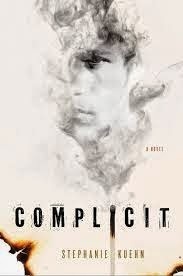
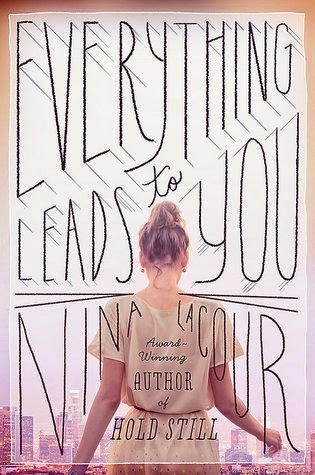
My last two predictions at this point are Stephanie Kuehn's Complicit and Nina LaCour's Everything Leads to You. Both were Morris winners and finalists respectively for their debut novels, and both titles earned starred reviews -- Kuehn's novel is at three as of this writing, but the possibility for it to earn more exists since it just came out. LaCour's has earned just one, but Printz books aren't necessarily ones that have garnered a slew of stars (nor even reviews, as White Bicycle proved). I reviewed Complicit last week and where I had issues with how the twist didn't work in Lockhart's book, the twist in Kuehn's was smartly executed and I think that it'll hold up on subsequent rereads.
As for the LaCour novel, I think the tight writing and compelling story will give this some discussion time, but I do wonder if the fact it's a romance (or love story?) will hurt its chances a bit. Not that the committee wouldn't discuss it fairly, but I wonder if the fact it's less traditionally literary will keep it from reaching the kinds of discussion I think it should. Then again, last year, Eleanor & Park earned an honor, which I'm still surprised/not surprised about.
A couple of other books at this point I think are contenders by virtue of starred reviews include Jillian and Mariko Tamaki's This One Summer -- so far the title with the most starred reviews and the last collaboration the team did, Skim, was certainly a title many thought had Printz potential.
I haven't yet read Kwame Alexander's The Crossover, but it's gathered a handful of starred reviews and while it skews on the younger end of YA, it's eligible. I've also got a feeling that John Corey Whaley's Noggin will be talked about but I can't say more because I haven't read it and haven't seen a whole lot of talk about it in the blogs I'm reading. I think that's because it's still relatively new, not because it's not a solid read.
And I bet that She is Not Invisible, another Marcus Sedgwick title, will be in the ring as a possibility.
As far as possibilities for titles publishing in the second half of the year, I've got Andrew Smith's second novel this year, 100 Sideways Miles, on my radar (it's already earned 3 starred reviews), Jandy Nelson's I'll Give You The Sun, and A. S. King's Glory O'Brien and the History of the Future in my mind. All of them have been talked about as solid contenders in the past, and I think that means they'll earn that sort of attention again. All of those books are ones I definitely plan on keeping an eye on to see where they may fall.
But at this point, I think the most honest assessment of Printz-worthy books is this: there are very few so far. It's been a less amazing year for YA fiction, and I think we might see some real surprises. I'm keeping my eye to smaller presses at this point to see what's standing out because I bet we see some White Bicycles not only in the final slate of titles come January, but I have a feeling as discussion among people who love doing mock events and discussing possibilities grows, there will be a lot of surprise possibilities.
That's what makes this fun, though.
The Morris
I haven't read as many books this year as I would have liked to, and I definitely have read fewer debut novels than I hoped. I still have half a year to get it together, so I'm kind of thinking in terms of what books have gotten great reviews and might be contenders to build the rest of the year's to-read list.
In fact, of the titles below, I've only read two. I have the Kiely and Cardi titles on my pile to get to sooner. Both earned some stars, and both sound like the kinds of books that would "fit" what the Morris committee looks for. The two titles I have read, Pointe and Far From You, were, without question, two of the strongest novels I've read so far this year in terms of writing, construction, and appeal, and I think both books left me really eager to see what Colbert and Sharpe will put out there next. Both were risky in terms of approach -- Colbert's because it tackled so much and did so in a way that was layered, allowing readers to delve into the complexity of Theo's life and Sharpe's because of how she wove two timelines together and offered up a main character in Sophie who wasn't reliable, thus forcing the reader to wonder what of her words were worth believing and which were not worth investing in.
For Cruel Beauty, I think the fact Kimberly loved it, as did a handful of other readers I trust, it's one worth keeping an eye on for Morris.
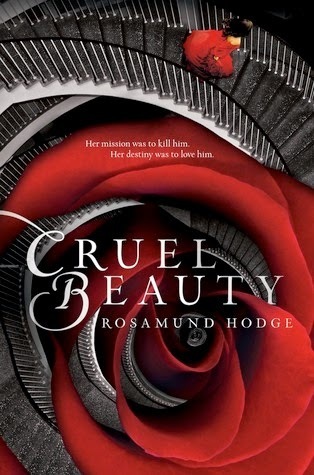
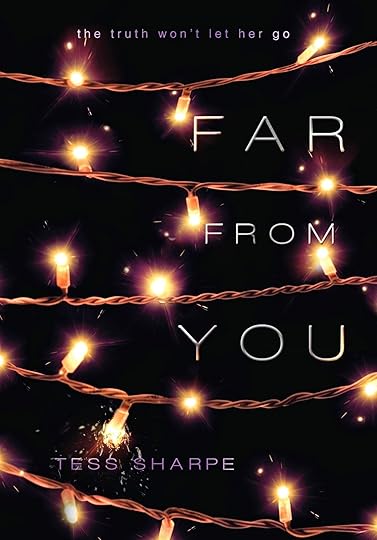
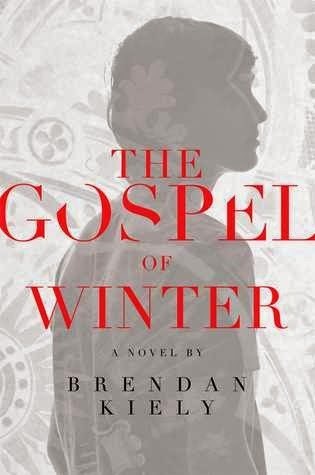
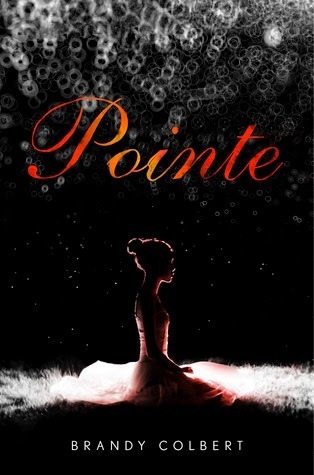
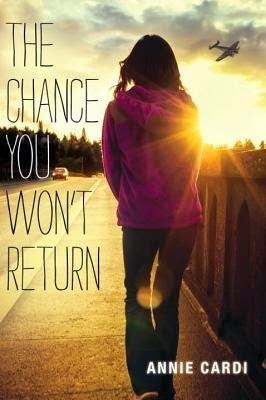
At this point, I'm still playing catchup on debuts from the first half of the year and haven't kept an ear to what's coming as well as I wish I had. But if I were to make a prediction, I suspect Robin Talley's Lies We Tell Ourselves is going to have some serious Morris discussion if it's written even half as well as the premise sounds.
Kimberly's Thoughts
For my predictions this year, I'm going to throw out three titles that I've read, plus speculate on a few that I've heard chatter about here and there. As before, I'll stick to SFF titles, since that's what interests me when it comes to discussions about award-winners.
The Printz
All of my Printz picks so far are dark horses. The Printz has been pretty kind to SFF titles the past few years (four out of the five past winners could arguably be called SFF in some way, and last year two of the honors were SFF as well), but I can't say I've read any that scream Printz to me - at least not yet. I think it's important to distinguish between titles that I loved and titles that are Printz-worthy, since those are two very different things. I've read a few books that I loved; I don't think I've read any that will get a Printz nod. Still, here are a few that have a slim shot, maybe.
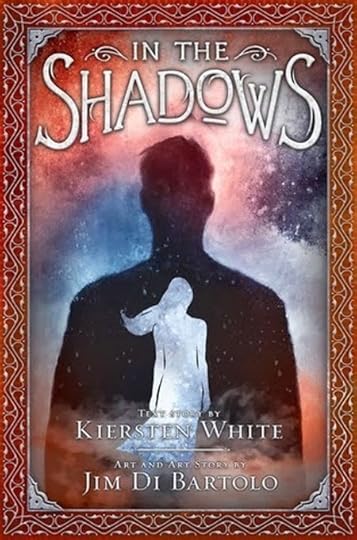

In the Shadows by Kiersten White and Jim Di Bartolo received very mixed reviews from review journals. Publishers Weekly says Di Bartolo's illustrations "suffer from a lack of pacing" and White's text is often "overshadowed by the instant impact of the pictures." Kirkus gives it a pretty critical review: "Ambitious but a failure both as a whole and in its parts." Booklist, on the other hand, gave it a starred review, calling it intriguing, enigmatic, enthralling: "The well-written words harmonize perfectly with the lushly executed, haunting images." I loved it, and I'm putting it up here because when the Printz goes SFF, it tends to go with the stuff that's weird or experimental (see: Going Bovine, Midwinterblood), and this is both. I think it's a deliberately challenging read that accomplishes more with its graphic/prose hybrid style than it could have otherwise.
The Winner's Curse by Marie Rutkoski may be even more of a long shot. As a society, we still tend to regard romances as lesser than other kinds of stories, and this is primarily a romance. But Rutkoski uses the romance to address huge, important themes (in addition to how and why we love one another, which is huge and important in itself): slavery, how we treat those we consider "other," conflicting loyalties, family, love of home. It's also got fantastic world-building (Rutkoski does this so well she makes it seem easy), great pacing, and smooth, lovely writing. Writing this blurb is making me want to re-read it, it's that good.
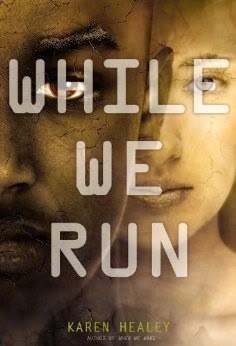
Karen Healey's While We Run rounds out my short list of contenders. I'm writing about it as a Printz possibility because it does what science fiction does best: reveal truths about ourselves and our world by writing about people and places that couldn't exist here and now. Healey's future is believable; it's a better place and a worse place than the world we live in now. Her characters are multifaceted and easily relatable to today's teens. Her exploration of a protagonist who has undergone severe trauma in a genre often characterized as "fluff" is incisive and admirable. I'm not sure how much the fact that it's a sequel would impact the judging, but it's better than the first volume and a terrific accomplishment in its own right.
A few other SFF titles that I've seen discussed a great deal as Printz possibilities include Grasshopper Jungle by Andrew Smith, Noggin by John Corey Whaley, and She is Not Invisible by Marcus Sedgwick. Both Whaley and Sedgwick have won previously, which makes their next books automatic contenders (they'll be discussed, at least). All three seem pretty weird (and that's saying something from an SFF fan). I'm not sure I'll read any of them, but they're worth knowing about.
Morris
I love the Morris because, as Kelly mentioned, appeal is a factor, and imperfect books - those that are exciting and lovely but flawed - can still win. I always feel like more traditional fantasy and SF have a better chance at the Morris than the Printz. They're also the ones I'm more excited to read when the winners and honorees are announced. Below are three I've read this year that I think may have a shot.
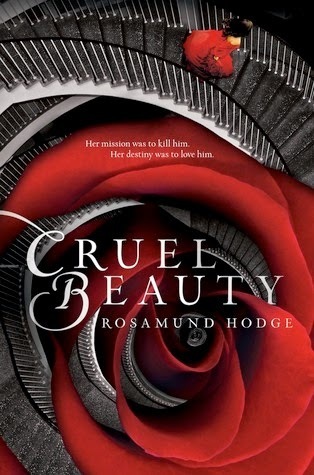
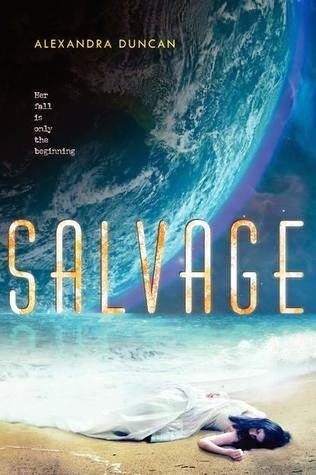
Cruel Beauty by Rosamund Hodge is the one I'm really hoping will get some recognition. It's hugely creative, beautifully written, and takes risks in its storytelling. The central love story is a bit darker than what you normally see, and although this is in large part a re-telling of Beauty and the Beast, that darkness is present in the Beauty as well as the Beast. It also weaves in elements of Greek mythology and other fairy tales while managing to keep the story unique. Its ambition is huge and I'm excited to see what Hodge does next.
Salvage by Alexandra Duncan is a sci fi feminist coming of age tale that masterfully takes the protagonist from sheltered naivete to wiser maturity. In a market crowded with action-heavy SF, Salvage stands out as being more introspective, perhaps a bit slower, but it's never boring. Duncan's ambition is vast here, too - she's created a number of different cultures complete with different slang and speech patterns. Her depiction of Ava as a girl overwhelmed in a world that doesn't understand her should resonate strongly with teens.
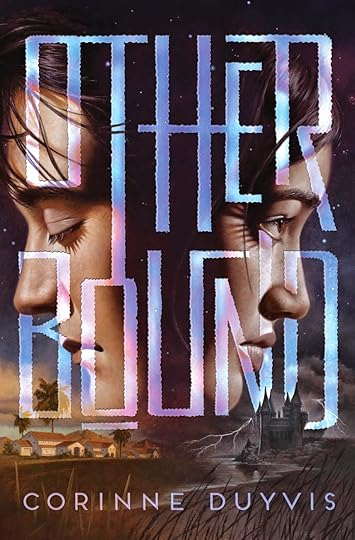
I just started Otherbound by Corinne Duyvis the other day, so I'm not very far into it, but I'm impressed by its originality. It features a teenage boy from our own world who sees through a girl from another world's eyes whenever his own are closed. Even when he blinks. This has led to a diagnosis of epilepsy. He's also disabled, having lost his foot in an accident as a young child. The girl whose body he inhabits is mute, her tongue having been cut out as unnecessary for her role as a servant. The concept is imaginative and the way it's written is clear and interesting. It's gotten starred reviews from Publishers Weekly and Kirkus.







 Related Stories2014 Youth Media Awards - Thoughts & ReactionsYouth Media AwardsOur Printz Predictions for 2013
Related Stories2014 Youth Media Awards - Thoughts & ReactionsYouth Media AwardsOur Printz Predictions for 2013
Published on June 25, 2014 22:00
June 24, 2014
The Kiss of Deception by Mary E. Pearson
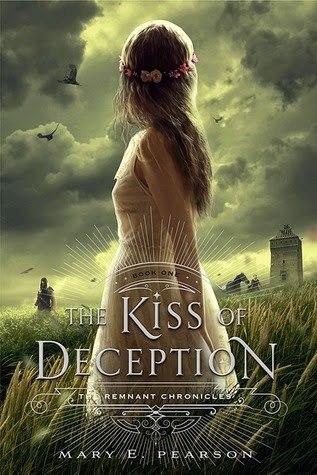 Pearson’s latest, a high fantasy kick-off to a series set in a pseudo-medieval world, is a big departure from her previous novels. She’s mostly known for the futuristic SF Jenna Fox Chronicles and a number of standalone realistic contemporaries.
The Kiss of Deception
proves her ability to write beautifully in any of these genres, and I wouldn’t be surprised if this series – called the Remnant Chronicles – surpasses her previous titles in popularity and acclaim.
Pearson’s latest, a high fantasy kick-off to a series set in a pseudo-medieval world, is a big departure from her previous novels. She’s mostly known for the futuristic SF Jenna Fox Chronicles and a number of standalone realistic contemporaries.
The Kiss of Deception
proves her ability to write beautifully in any of these genres, and I wouldn’t be surprised if this series – called the Remnant Chronicles – surpasses her previous titles in popularity and acclaim.Lia is a princess, the first daughter born to the king and queen of her country, which means she should have the sight (the ability to see or predict future events). She doesn’t. Her parents are sure it will appear, so they arrange a marriage between her and the prince of a neighboring country, based in part on her nonexistent ability. The two countries’ relations are tense, and this marriage would go a long way toward smoothing things over. But Lia knows her parents are manufacturing a deception, and she’s sure it will end in disaster, not to mention the fact she’s never met this man she’s supposed to marry. So she flees, along with her maid and friend Pauline.
They travel to a distant town, where Pauline has a relative who will set them up with jobs at her inn. Lia and Pauline are no longer princess and maid; they’re two common girls working honest jobs. Unbeknownst to Lia, the two young men who show up in the same town soon afterward are not who they appear either – one is the prince whom Lia jilted, and the other is an assassin sent to kill her. Lia must navigate her new life as well as the attentions of these two young men/boys – attentions which may appear friendly or romantic, but are potentially anything but. As a reader, I was right there alongside Lia, knowing just a touch more than her, but having to figure out most of it as she does.
It sounds a bit generic, and that’s a fair claim to make, actually. The basic plot is one you’ve likely read before, if you read much high fantasy at all (princess runs away from home to escape arranged marriage, encounters adventure). But the way the book is crafted – how the story unfolds – is what makes it special. Pearson juggles multiple narrators (Lia, the prince, and the assassin), all of them unreliable to some degree, revealing just enough at certain points to keep us reading further. When readers finally learn a big truth late in the story, it will send them flipping the pages back to spot the clues Pearson dropped for them – and they’re all there.
Writing a book with a “twist” (though I hesitate to call it that here, since it implies trickery) can be tough. Some readers love the feeling of surprise, while others may feel deliberately misled or lied to – manipulated, in other words. I suppose all fiction writing can be called manipulation, but it didn’t feel like that in Kiss of Deception. Rather, I felt that Pearson was challenging my assumptions, both as a reader and simply as a person who regularly interacts with other humans. Specifically, she’s telling her readers not to make assumptions about the people we come across – for good or ill. I also think it equally likely that many readers will not be fooled by the red herrings along the way and will easily see the truth from the outset, which is part of what makes the crafting of the story so good. These readers may even be surprised to learn that others were fooled into thinking something entirely different.
The Kiss of Deception is great not only because of this particular plot point. For much of the story, the pace is slow, leisurely, but it’s far from boring. It’s a bit of a world-building lovers’ dream: we see Lia settling into her life at the inn, learning her job and how to interact with people on their own level rather than as a royal. It’s a cultural shock of sorts, but Lia’s up to it. Sometimes she falters; sometimes she triumphs. She grows and comes into her own as a young woman. It’s interesting and quite literally builds character (just not in the way your mom tells you scrubbing the toilet will). By the time the plot really gets rolling a bit later on, I felt like I knew Lia well and saw things clearly through her eyes.
There’s romance here, and it’s lovely, but this is also a story about friendship. While Lia is clearly the protagonist, Pauline gets quite a lot of page time. She’s the best friend, yes, but she’s also a person in her own right, with her own dreams and disappointments. As her former maid, Pauline’s relationship with Lia could have suffered mightily once they started relating to each other in a different capacity. Instead, their friendship deepens. They continue to trust one another, comfort one another, and help each other past the rocky times, even if they do sometimes disagree. I was so glad Pearson didn’t manufacture jealousy and spite to end their friendship, as I’ve seen done in other similar stories before.
I read a lot of YA that feels a bit unfinished or just not as good as it could have been. Maybe the novel is the author’s debut, or the editing is a bit poor, or ideas are hazy or the writing a bit sloppy. That’s not the case here. It’s a beautifully crafted, sophisticated novel with fully-fleshed characters and an original way of telling the story. It’s perfect for any high fantasy fan, but especially good for those who loved Graceling and other fantasy novels that tackle the idea that your life should be your own to make, not anyone else’s.
Review copy provided by the publisher. The Kiss of Deception will be available July 8.







 Related StoriesComplicit by Stephanie KuehnMambo in Chinatown by Jean KwokCovers Through the Years: The Golden Compass
Related StoriesComplicit by Stephanie KuehnMambo in Chinatown by Jean KwokCovers Through the Years: The Golden Compass
Published on June 24, 2014 22:00
June 23, 2014
Mambo in Chinatown by Jean Kwok
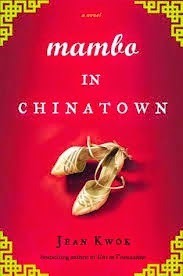 Charlie is 22 years old and has been working as a dishwasher in the same restaurant as her father for years. Beyond leaving scars and burns on her hands, it's the kind of job she doesn't want and knows won't fulfill her. At the same time, she recognizes that what she's doing matters in some ways because it's an honorable thing to be doing alongside her father.
Charlie is 22 years old and has been working as a dishwasher in the same restaurant as her father for years. Beyond leaving scars and burns on her hands, it's the kind of job she doesn't want and knows won't fulfill her. At the same time, she recognizes that what she's doing matters in some ways because it's an honorable thing to be doing alongside her father.But when her friend tells her about a job opening as a receptionist at a dance studio, Charlie jumps at the chance. She knows it means telling a lot of lies to her father, and she knows that she wouldn't necessarily be good at the job. It's an important opportunity, though, to get out of the kitchen and more, it's an opportunity to connect with the passion for dance her mother had before she died, even if she herself won't be dancing.
Mambo in Chinatown is Jean Kwok's sophomore novel, and it's excellent. I read her debut Girl in Translation as part of the Outstanding Books for the College Bound (which I've yet to talk about in my posts about this) and when I heard her second book was coming, I knew I was in for a treat.
This is a story about an American born Chinese girl who takes a shot at a new job knowing she won't be good at it and knowing that all of the lies she needs to construct could get her into huge trouble with her father and with the Chinatown community (it's a very small community, she tells us, which means that any misdeeds or any movement outside of acceptable traditions and honors causes a lot of gossip). Charlie chooses to pursue the opportunity, though, and it's not long before the people at the studio notice she's not good at the work. It's not for lack of trying. It's simply that Charlie has trouble with reading and with memory, and so she's not well-suited to keeping agendas and schedules.
Fortunately for her, a mishap also means that she's been asked to teach a beginner dance class. Sure, her mother was a dancer -- that's part of why this job was so appealing to Charlie -- but she herself has no skills whatsoever. She tells us again and again she's the opposite of the dancers and instructors in the studio: where they are sleek, shiny, and float, she is dowdy, wearing worn-out hand-me-downs, and she's the opposite of light on her feet. Those around her notice this, but they also see something more, which is why she's called to teach. They believe that even with no skills or experience, she can learn enough in a couple of days to teach the basics to students who know nothing.
So she takes the chance.
Meanwhile, she's told her father that she's been working "with computers." It's a way of building an honorable lie, one which makes her look like she's doing something that's meaningful and good, progressing her future, but it's not one that makes her look like she's trying to escape or "do better than" him or others in her community.
A big component of the story is that of Charlie's relationship with her 11-year-old sister Lisa, who is exceptionally bright and intelligent. Charlie and Lisa are very close, and when Lisa's afforded the opportunity to test into an advanced high school, Charlie steps up to argue on Lisa's behalf to her father, who thinks that were she to be accepted, it would be a mistake. That it would cause the family more problems than it would be worth. But as the test date gets closer, Lisa becomes more and more ill. It began with wetting the bed, then progressed to times when she'd lose all feeling in her legs. When she'd be unable to work at her Uncle's medical practice because she was simply too sick (you did read that right -- Lisa, 11, worked for her Uncle because that's how this family needs to make ends meet and it's a way to help a family member). Charlie's concerned about the turn in Lisa's health, and while her father sees no reason to move beyond Eastern medical practices for healing -- led by a woman who Charlie dubs the Vision -- Charlie believes Lisa needs to see a Western medical practitioner. Knowing the experience the family had with Western medicine when their mom took ill, including huge medical expenses, Charlie's not convinced her father will listen.
And he doesn't.
Charlie's singular teaching experience comes with the notice that she's losing her job. That she's a terrible receptionist and that she can't stay at the studio. The bright side, though, is that she's offered more teaching opportunities because, despite her inexperience, she's got something in her that shows maybe she's a natural. That maybe dance is something she can get good at. Charlie's excited and nervous -- does she have the clothes? Can she get good? Why do they trust her with this when she's proven she can't even keep a date book right? More, how does she keep up the lies she's told her family?
But things fall into place. She's helped along the way by people at the studio (which, don't think there aren't detractors, because there certainly are) and by her own raw determination to succeed.
Mambo in Chinatown is about how to balance the past with the present and how to honor sacred, important cultural traditions with one's interests and passions in building and establishing a new identity and new roles in a new culture. Charlie's forced to consider what it means to seek out her interest in dance with what it means to remain humble and remain invested in the traditions of her family and the larger Chinatown community. Kwok does an exceptional job of rendering this lesser-visited part of America in a way that's reverent toward both sides of the story. We want to see Charlie succeed in dance, but we also see why it's so important for her to listen to her father and why it's so important for her to keep some of those traditions and customs as part of her life now. There's great honor in both, and it's about how Charlie chooses to balance both of those worlds.
One of the best lines in the book comes when she's put in the position to attend a competition. Where she'd otherwise step back, hide from the limelight, she decides that she's ready to go on, even when she knows it means a lot more than simply having to work hard to do well. She notes, "All my life, I'd been trying to fulfill other people's ideas of who I was supposed to be and failing, and this was my chance to try to become who I was meant to be."
Dance and the dance culture do an excellent job of paralleling this, too -- while what we get to see in Charlie's world appears to be cut and dry, even romanticized, she's warned that the bigger world of dance is far from it. That competitions and the world beyond this particular studio are can be filled with one-night stands, with drugs, with drinking, and with partying in exceptionally unsafe ways. It's not until she's put into a position to be at a competition with a partner that she sees it. And when she does, it rattles her a bit; she's able, though, to pull from her own personal convictions and morals to understand that while other people partake in those activities, she doesn't have to if she doesn't want to.
There is a romance in the novel between Charlie and the student she's paired with. While she knows it's forbidden to be in a relationship with a student by the rules of the studio and punishable by job termination, she avoids pursuing those feelings. Fortunately, a few technicalities that work out later allow her to see where this romance could lead, and it's a really nice and rewarding part of the read. Yes, she falls in love and yes, it's with someone who has the same kind of feelings towards her. It's another smart parallel to the idea of balancing the old world of tradition with the new world of opportunity.
But my favorite part of Kwok's novel is the relationship between Charlie and her sister Lisa. The huge age difference here is crucial, as is the fact these girls don't have a mother in their life. There are strong women who interact with them and who guide them -- particularly Charlie -- but it's their reliance and love for one another that shines through. When Lisa becomes sicker and sicker, it weighs so heavily on Charlie's mind that she does everything she can to learn as much as possible about how to help her sister. She becomes as well-versed in navigating the American medical system as possible, and the confusion, frustration, and angst it gives her is realistic. While she listens to her father's determined stance against it and belief that only Eastern healing will work, Charlie knows that a balance of the two is what's really needed. So when Lisa reveals something that happened to her, something that caused her to lose control of her body in really awful, hard-to-read ways, Charlie knows she has to step in and take charge of the situation, even if it means making her father angry. It's then, of course, much more of the story unravels and Charlie's father learns more about the true nature of his daughter's new job...and the incredible nature of his daughter/s.
Mambo in Chinatown is an adult book but it has loads of teen appeal. Readers who love stories set in urban metropolises that aren't about smart, rich, elite people will eat this up, as it offers a glimpse into the labor class life of Chinatown. More, readers who love stories about dance and pursuing one's dream will find so much to appreciate in Charlie's story. It's a well-paced, consuming read with well-written, dynamic characters who never once feel anything less than real.
Mambo in Chinatown is available today. Review copy picked up at ALA Midwinter.







 Related StoriesComplicit by Stephanie KuehnThe Fever by Megan AbbottFour Short(er) Contemporary YA Reviews: Jennifer Brown, Katrina Leno, Steve Brezenoff, and Amanda Maciel
Related StoriesComplicit by Stephanie KuehnThe Fever by Megan AbbottFour Short(er) Contemporary YA Reviews: Jennifer Brown, Katrina Leno, Steve Brezenoff, and Amanda Maciel
Published on June 23, 2014 22:00
June 22, 2014
On Blogging, Responsibility, and Content Ownership

Every once in a while I think about blogging about blogging. It feels meta, but periodically, something in the blogging world catches my attention and I think about the value of writing about writing.
Being a blogger is being part of a community -- one that's both populated by bloggers and by those who enjoy reading blogs but don't necessarily blog themselves. Both of those groups constitute a readership for a blog, and the reasons behind readership don't necessarily land neatly into any categories.
Bloggers who read other blogs don't necessarily do so because they want to read about blogging; they read because they care about the person who is writing or they're interested in what they have to say about whatever it is they choose to write about (or parts of what they choose to write about, even if it's not every single post they write). Readers who don't blog may choose to read because they love the topic at hand or because blogging is something they want to pursue some day. Maybe they read because it's part of their professional development or because they find that the blogger shares a lot of similar thoughts that they have but don't express openly. Perhaps they read because the blogger is someone they regularly disagree with and they enjoy that tension (and that's legitimate and awesome -- I read a few blogs that I disagree with because I love seeing the other side of a book review or belief about reading/books).
Whatever the reason behinds why someone reads a blog, bloggers write because they like to and they write the content they feel compelled to write. Even if the thought of readership isn't at the forefront of the blogger's mind, it's always there: what you choose to say or not to say is indeed thinking about audience and readership. There's a reason there's very little personal content at Stacked, except in the context of a review or discussion of a book or reading. Besides the fact this is a book blog, personal things aren't what I want to share in this space except when I feel comfortable enough doing so, knowing that my readership can see whatever it is I write.
Not everything every blogger writes will be of interest to all readers. That's the beauty of blogging. It's like a magazine in that the content that's of interest can be absorbing, but the stuff that's not going to capture your interest is easy to skip over. You can still appreciate the effort or idea, even if it's not your jam.
But a blog is a blogger's space. The blogger gets to make the decisions about what she or he writes about, how she or he presents it, and how she or he chooses to be upfront or honest about whatever they share with their readership. In turn, that readership responds in some capacity.
Your blog is your reputation.
This is all an introduction to talk about a few things in going on in the blogging world I feel are worth talking about both to those who are bloggers, as well as those who aren't. It's not a how-to, and it's in no way a guide to how to blog.
Rather, I hope this can generate some discussion about blog and blogging related topics worth talking about, since a few have popped up recently that deserve to be talked about, both with those who blog and those who don't write but who consume blog writing. This may be the first in a series of posts on blogging over the course of the next few weeks.
Do you blog for or about?
Kim Ukura wrote two posts in the last couple of weeks that I think are must-reads for bloggers, both those who are new and those who are seasoned. The first, Why Isn't Just Reading Enough Anymore, talks about a new program through Crown Publishing Group called "Blogging for Books," wherein bloggers register and agree to review books in exchange for copies of those books.
I think readers and bloggers know that many of the books we review here at Stacked, as well as books reviewed at other blogs, come from publishers. They're sent to us solicited or unsolicited, either as review copies (meaning they're imperfect) or as finished copies, or they're available to take at conferences such as ALA or BEA. I can't speak for Kimberly, but I can say I personally request very fewARCs when pitched; I get seasonal packages from some publishers, wherein the bulk of their YA catalogs are sent to me, but only when I know there's something I really want to read and consider for review do I take the time to ask the publicist. It's a time and space issue -- there are only so many hours in a day, and there's only so much space in my house. Likewise, I know my tastes well enough that I can guess whether title is going to work for me or not. A lot of times if I end up not requesting a title and I see a lot of positive reviews of it and change my mind, I can grab it at Netgalley or Edelweiss or I wait and either buy it or pick it up at the library.
I never feel obligated to review anything, and even when I do accept or request a title, I always note that it's for consideration and I never make any promises. Sometimes, I don't get to a title in a timely fashion, and sometimes, I read it and decide I don't want to review it (sometimes I just don't feel like writing a review and that doesn't reflect the book but my interest in writing). Other times, I may sneak a mention of a title into a book list or into a discussion about something else I'm interested in.
And sometimes? I don't do anything with the book.
What Kim talks about in the post, though, isn't that. Crown's program, while it looks like an awesome way to streamline blogger requests, has some serious strings attached to it. It requires a review in exchange for the ARC/book that is requested, and it asks that bloggers not just write about the book on their blog, but that they should then share that review across all kinds of outlets, including retail outlets and other social media the blogger may be on. Doing this builds buzz for a title.
Kim's second post, on her personal blog, dives deeper into the "Blogging for Books" program. She talked with a program coordinator and had some of her concerns not just heard but they were put into consideration and aspects of the program were reworded. But, like Kim, the standout to me in the response was this: "Just as there is an understanding that a blogger would review a book after requesting it, we are reflecting that arrangement through Blogging for Books."
There is never an arrangement between blogger and publisher. It's not an understanding, and it's not an arrangement. A blogger isn't beholden to a publisher nor are they beholden to a book. A blogger is beholden only to his or her blog and his or her audience.
That's it.
The vast majority of publishers we work with are wonderful, as are those authors who pitch at us directly. Like Kim, I utilize the phrase "for consideration" when making requests, as well as when I agree to a pitch. There's no agreement something will happen; I get to make that choice when it comes to reading and I get to make the choice of whether or not I write about it. If I read something and don't think our readers would be interested, I'm not going to write about it. If I don't want to write about something or if life gets in the way of something, I'm not going to push myself to do it. This is my space and Kimberly and I both agree that when this stops being fun, then it stops being what we do.
Because here's the thing: I don't blog for books. I blog about books. Those two little words are extremely different. One suggests there's obligation and the other does not.
I blog for my readers about books. I'm not paid by anyone to write what I write; the advertising revenue we generate goes right back to our readers in the form of giveaways and minor site hosting fees. Bloggers work exceptionally hard at what they do when it comes to reading and thinking about the books they're reading, and they work hard at writing about them and getting that information out to their readers. They do it because it's a passion and an interest, not because they're employed by a publisher or an author or a marketing company to do so.
My favorite part of Kim's first post is this and I think it's worth repeating:
It’s frustrating that it’s not enough to just read. Readers now have to share everything they read with followers across a variety of platforms with hashtags and @ replies to interested parties. It’s not even enough to write reviews of books you love. Those reviews need to be on retail sites and pushed out through social media too. Being a good reader means being a good “word of mouth” marketer without any of the perks that come with having that job.Now, I’m not saying that enthusiasm is a bad thing. I love to gush about books that blew my brain or were just a ton of fun to read. It’s fine to love independent bookstores and advocate for readers to buy local. And it’s even okay to express support to one side in a business dispute if you disagree with the business tactics of a particular conglomerate.Readers can evangelize, but we should only do it for the books that truly deserve it. If readers enthuse over every book, it makes that enthusiasm dishonest – a problem for readers, publishers and authors. You can’t be a sincere evangelist for what you don’t really believe in. And if you don’t really believe in it, no one should ask you to evangelize for it.Enthusiasm shouldn’t be required or even expected of readers. Readers should not be pressured or cajoled or guilted or tricked or passively forced into being enthused or publicly sharing that enthusiasm on behalf of The Publishing Industry.Blog for yourself and your readership. Be enthusiastic authentically, not because you're told to be that way. Don't blog because you want books. The books will be there.
Your readership though? They might not be.
Sponsorships and Disclosures
Tangentially related to blogging about, rather than for, is something I've seen popping up more and more, and that's sponsored posts. Those are posts written because the blogger is being paid to write the content.
Sponsored posts can come in a variety of forms. Over at Book Riot, I wrote a sponsored post for the "I Read YA" campaign last month, wherein I got paid a small amount (under $30) to write a post about YA fiction. That was the entire requirement -- I could write anything I wanted to, and the content was mine to decide, to execute, and to share. I had no limitations put upon me. I chose to write about diverse titles coming out this year because it was a post that added value to my own reading life and it was one I knew that my readership and the readership at Book Riot would want to see.
At the very top of that post, there's a disclosure noting that it is a sponsored post. I suspect no one noticed that and no one cared because the content was all mine.
Kimberly and I have never written a sponsored post here, and I think it should be obvious from the prior section of this post that we've never felt obligated to review a book here, either. We're picky about taking on blog tours because we know what we like and we know what our readers do and don't like seeing. I suspect were we approached about a sponsored post, we'd take the exact same approach as we do with tours: is it something our readers would care about? How much control would we have over the content?
This is our blog, it's our space, and we're beholden only to ourselves and our readership.
While I haven't seen it so much in the blogopshere yet (though I've heard rumors which haven't been substantiated), I have seen some sketch examples of sponsorship popping up in other bookish arenas of the internet. Last week, for example, I saw a BookTuber/Vlogger with a massive following do two sponsored posts in a row. Not a huge deal.
The problem was that one of those sponsored vlogs was a book review, and the note about it being a sponsored post -- again, content that has been paid for -- was buried in the very bottom of the notes section under the video. It would be exceptionally easy to miss and never see, and the video itself didn't make the disclosure. While there are ethical questions to consider about that, the real issue for me presented itself in the fact this was a sponsored review.
The vlogger was paid to review the book, and the disclosures were hidden.
This is a huge red flag to me, tying into to a lot of the issues mentioned above. How can I trust that review is authentic? Can I? What about the vlogger's other reviews? At what point do you give up your audience's trust in exchange for a few bucks from the publisher?
Sometimes, you get the opportunity to do a sponsored post, which means a little extra cash. There's no shame in taking that on, but I think there's a lot to be discussed more openly about the ethics of how sponsored posts work. Upfront disclosure should be a must, and what of reviews that are sponsored? Because there's a huge difference between reviewing a book received as part of a blog tour or as part of a publisher's mailing or requested by a blogger where there is absolutely no cash or goods exchanged and reviewing a book for which you got paid to review.
Is it for the book or is it about the book?
The Landscape
Are there other interesting issues within the blogging world worth talking about at this point in the game? I'm sure there are. For the most part, I like to just write. I love looking things up, thinking about them, then considering what the takeaway is. And for me, the takeaway is both what I get out of writing and what I think readers may get out of it. It's fascinating to see that even after 5 years of doing this, it's worth reminding myself and readers -- both those who blog and those who do not -- why blogging is great and why it matters. I think it's clear that it's a powerful medium, one which people want to get in on because it makes a difference.
The bottom line of blogging for me is this: am I adding something to someone's day?
Because if I'm just adding noise, rather than value, I'd rather step back and reassess.








Published on June 22, 2014 22:00
June 21, 2014
It Happens: A Giveaway
I have been meaning to do a big link post, since I've been not doing the Links of Note with the regularity I'd like to be. Part is that I've been doing the Critical Linking posts for the weekend at Book Riot and I don't want to replicate stuff, and part is just that I have a pile of links saved I want to share and haven't had time to think about the way I want to yet. Soon!
But in the mean time, these landed at my door yesterday:

So how about a giveaway?
I'll send one copy of It Happens to a US or Canada resident. I'll pick a winner at the end of the month.
And since I've been asked a few times, I thought it'd be worth noting that if you'd like to purchase a copy, you can get it at most book retails on the internet, including Book Depository.
Loading...






 Related StoriesIt Happens: It's HereGiveaway: THE FEVER by Megan AbbottIt Happens Update
Related StoriesIt Happens: It's HereGiveaway: THE FEVER by Megan AbbottIt Happens Update
But in the mean time, these landed at my door yesterday:

So how about a giveaway?
I'll send one copy of It Happens to a US or Canada resident. I'll pick a winner at the end of the month.
And since I've been asked a few times, I thought it'd be worth noting that if you'd like to purchase a copy, you can get it at most book retails on the internet, including Book Depository.
Loading...







 Related StoriesIt Happens: It's HereGiveaway: THE FEVER by Megan AbbottIt Happens Update
Related StoriesIt Happens: It's HereGiveaway: THE FEVER by Megan AbbottIt Happens Update
Published on June 21, 2014 22:00
June 20, 2014
It Happens: It's Here

The first copy of my book showed up in the mail yesterday, and I'm really happy with it. I hadn't seen the finished product -- hadn't seen any steps of the process after going through a set of proof pages months ago to give feedback on design -- and getting the chance to page through it was surreal and exciting and a lot of fun yesterday.
It's neat to see how it came together, and I have to say my favorite part of the book might be this:

There's a 22-page index in the back of the book. It's actually three indexes: two of them have locations on them and the one pictured above (obviously) does not.
I plan on doing a giveaway when my personal copies arrive, but I've been keeping an eye on where it is available for purchase. And while the publication date is technically August 15, it's shipping now and available now. You can buy it at VOYA's site with a 20% subscriber discount. You're also able to purchase it at Amazon, Barnes & Noble, and Book Depository, all of which have the book discounted. Through Book Depository you can also get free shipping worldwide. It won't be in bookstores, since it's a specialty market title, but if you're going to ALA next week, you might be able to buy it at VOYA's booth (or take a picture for me, which would make me so happy).
It's weird to think this book is 2 years in the making. I put in the proposal in October 2012 after brainstorming what could be a worthwhile project to pursue. I wrote it, edited it, had 2 amazing people read and give me huge and significant feedback on it, did some more revising, then turned it in in June 2013.
Now it's out there, and that's neat. I hope it's a valuable resource and tool to readers who want to know more and learn more about contemporary realistic YA fiction, as well as reader's advisory. The two things are married in my mind, and so they're also married in the book.
Between this and finishing a webinar for librarians yesterday, it feels like the end of a chapter in formal librarianship for me. It's weird, but I feel like I walked away with so much from this field and it'll never leave me. Like reader's advisory and YA fiction, librarianship and I will always be married to one another.
I'm excited to take this knowledge and these experiences and apply them and think about them through the next chapters.







 Related StoriesIt Happens UpdateCirculating Ideas Interview & Excerpt from "It Happens"A Million Little Followups (& A Thank You!)
Related StoriesIt Happens UpdateCirculating Ideas Interview & Excerpt from "It Happens"A Million Little Followups (& A Thank You!)
Published on June 20, 2014 13:22
June 19, 2014
Giveaway: THE FEVER by Megan Abbott

Last week, I raved about Megan Abbott's The Fever.
Now that the book is out, how about a giveaway?
I've got one finished copy of The Fever to give away, open to US resident only. You can enter in the form below, and I'll pick a winner at the end of June.
Loading...







 Related StoriesTwitterview: Karen Sandler (+ giveaway!)What Goes Around by Courtney Summers -- A GiveawayTwitterview: Phoebe North
Related StoriesTwitterview: Karen Sandler (+ giveaway!)What Goes Around by Courtney Summers -- A GiveawayTwitterview: Phoebe North
Published on June 19, 2014 22:00



